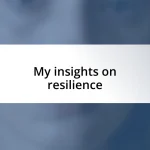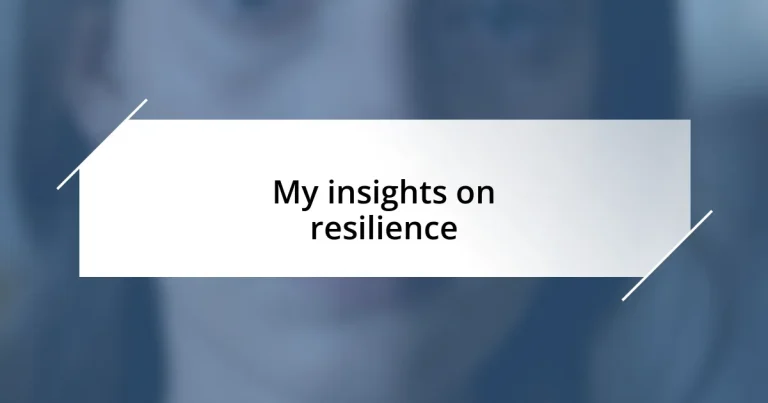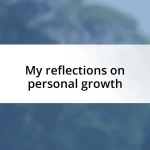Key takeaways:
- Resilience is a dynamic process that involves emotional growth and adaptability through life’s challenges.
- Building resilience can be achieved through self-care, fostering a growth mindset, and cultivating supportive social connections.
- Personal experiences, such as grief or career setbacks, can catalyze significant emotional processing and lasting personal growth.
- In the workplace, resilience hinges on collaboration, realistic expectations, and the ability to manage stress effectively.
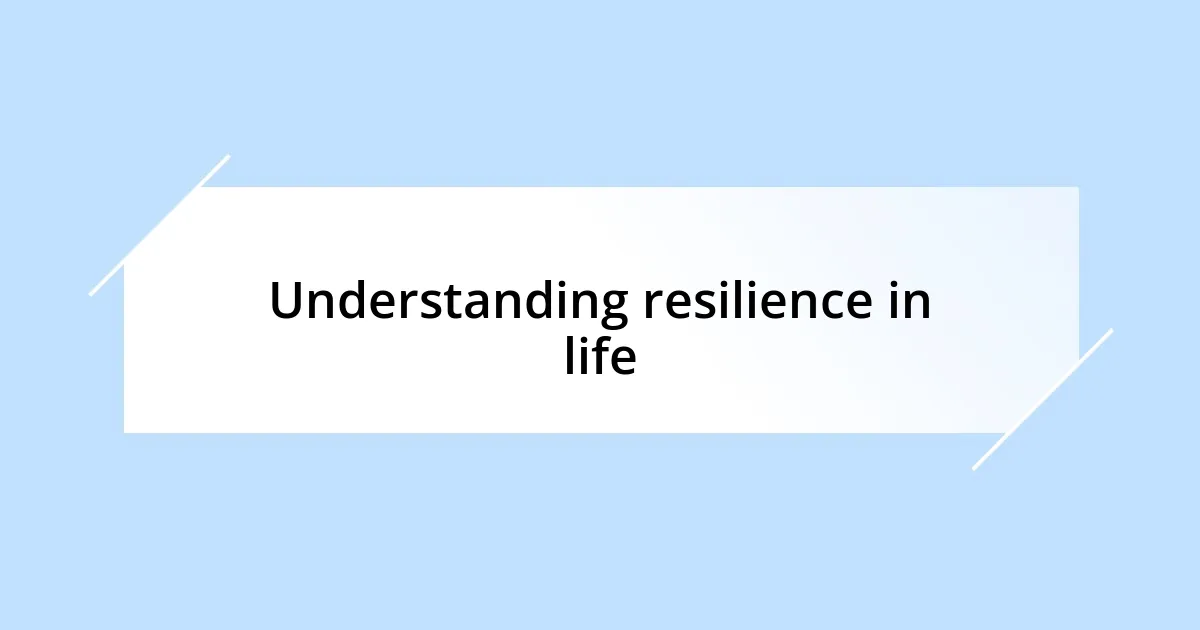
Understanding resilience in life
Resilience in life is not just about bouncing back from adversity, but also about growing through challenges. I recall a time when I faced a significant setback at work that left me feeling defeated. Instead of sinking into despair, I focused on what I could learn from the experience. Have you ever noticed how these tough moments can shape our character?
I often think of resilience as a muscle; the more you stretch it, the stronger it becomes. After a particularly difficult breakup, I found myself reflecting on what I truly valued in relationships. This introspection not only helped me heal but also guided me in building healthier connections later on. Isn’t it fascinating how pain can pave the way for personal growth?
Emotional resilience allows us to navigate life’s inevitable ups and downs with a sense of hope. During a family crisis, I learned that vulnerability is not a weakness but a pathway to deeper connections. By sharing my struggles, I found solace in the support of others. How have you harnessed your resilience in moments of hardship?
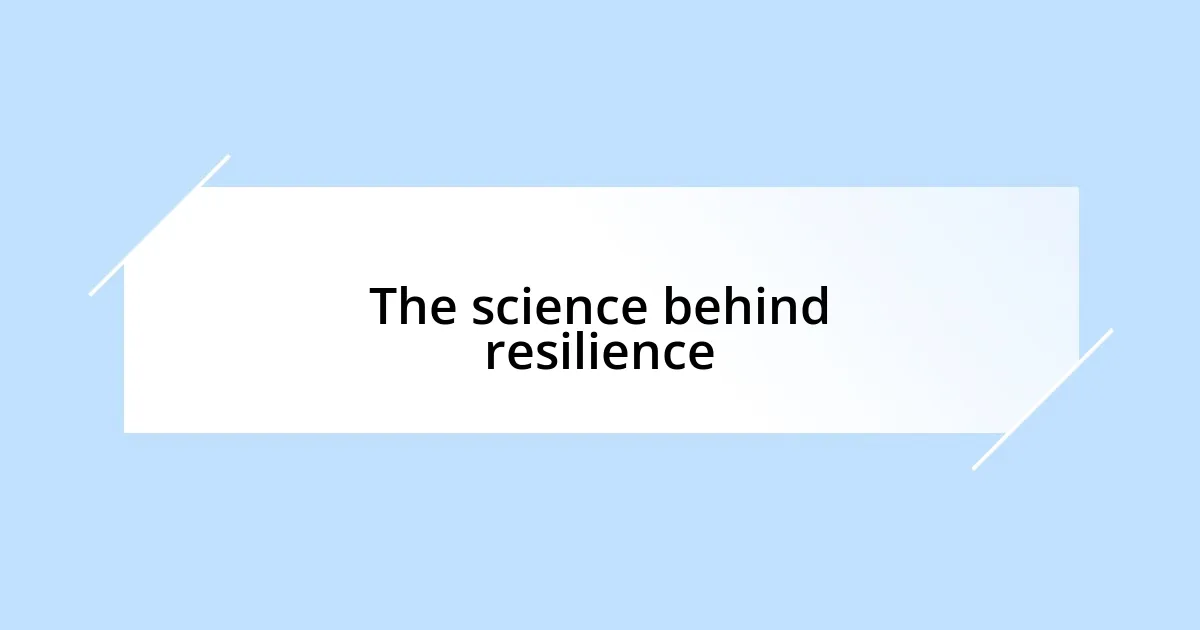
The science behind resilience
The science behind resilience reveals how our brains respond to stress and adversity. When we encounter challenges, our bodies release stress hormones like cortisol, which can impact our mental health. Personally, I was surprised to learn that resilience is also influenced by our environment and relationships. For instance, during my university days, I surrounded myself with supportive friends who helped me persevere through academic pressures, illustrating how social connections can bolster our resilience.
Research shows that resilience can be developed through practice and positive psychology techniques. I remember experimenting with mindfulness meditation during stressful periods, which helped me cultivate a more balanced approach to life’s hurdles. This practice not only improved my emotional well-being but also provided me with strategies to remain grounded when faced with difficulties. Have you explored any techniques to enhance your own resilience?
Neuroscientific studies indicate that resilient individuals often possess strong problem-solving skills and a flexible mindset. I found this to be true in my own life when I faced unexpected changes in my career path. By embracing adaptability and viewing challenges as opportunities for growth, I discovered that I could approach obstacles with a proactive mindset. How do you adapt your thinking when faced with challenges?
| Aspect | Details |
|---|---|
| Stress Response | Involves the release of hormones like cortisol; affects mental health. |
| Social Connections | Supportive relationships enhance resilience. |
| Mindfulness | Practices such as meditation improve emotional well-being. |
| Adaptability | Flexible mindset and problem-solving skills are essential for resilience. |
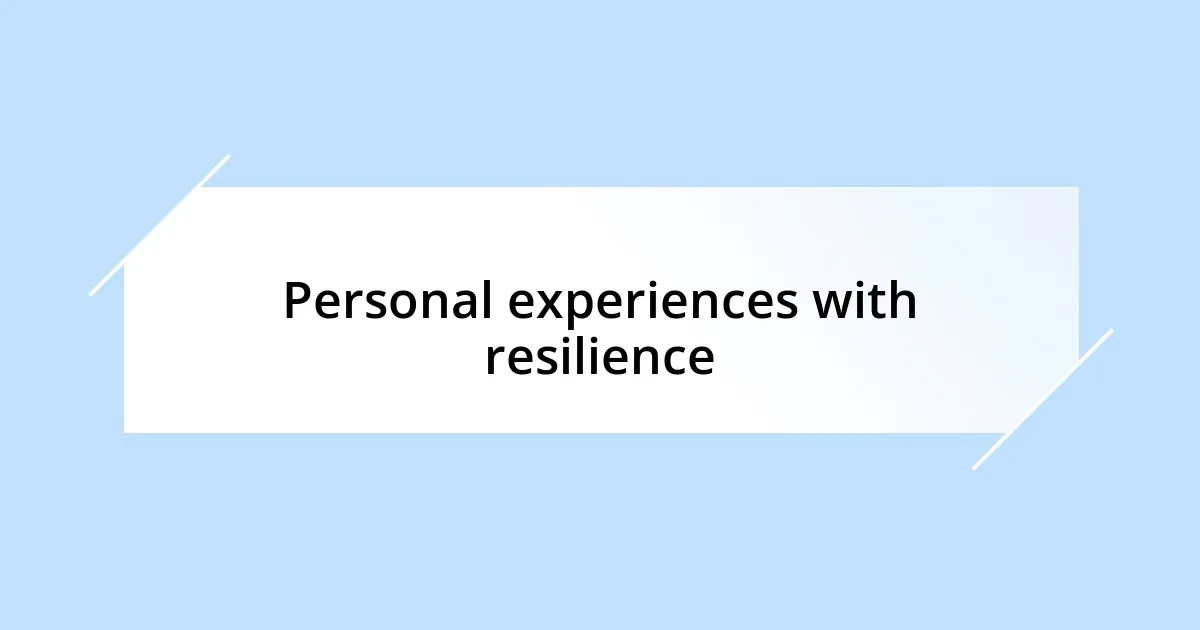
Personal experiences with resilience
Resilience often reveals itself in unexpected ways. When I lost a close friend suddenly, I was overwhelmed by a tidal wave of grief. However, this experience pushed me to lean into my emotions instead of suppressing them. I began journaling my thoughts as a way to process my feelings, finding that writing not only helped me cope but also allowed me to celebrate my friend’s life. Isn’t it interesting how tragedy can sometimes illuminate new paths for healing?
Reflecting on these experiences, I see several important lessons about resilience:
– Emotional Processing: Allowing oneself to fully feel and express emotions can facilitate healing.
– Journaling: Writing can serve as a therapeutic outlet and a way to document one’s journey.
– Celebration of Life: Honoring memories offers a sense of connection and purpose amidst loss.
– Community Support: Leaning on friends and loved ones can create a robust safety net during challenging times.
– Adaptation: Adapting one’s approach to grief can lead to personal growth and stronger emotional health.
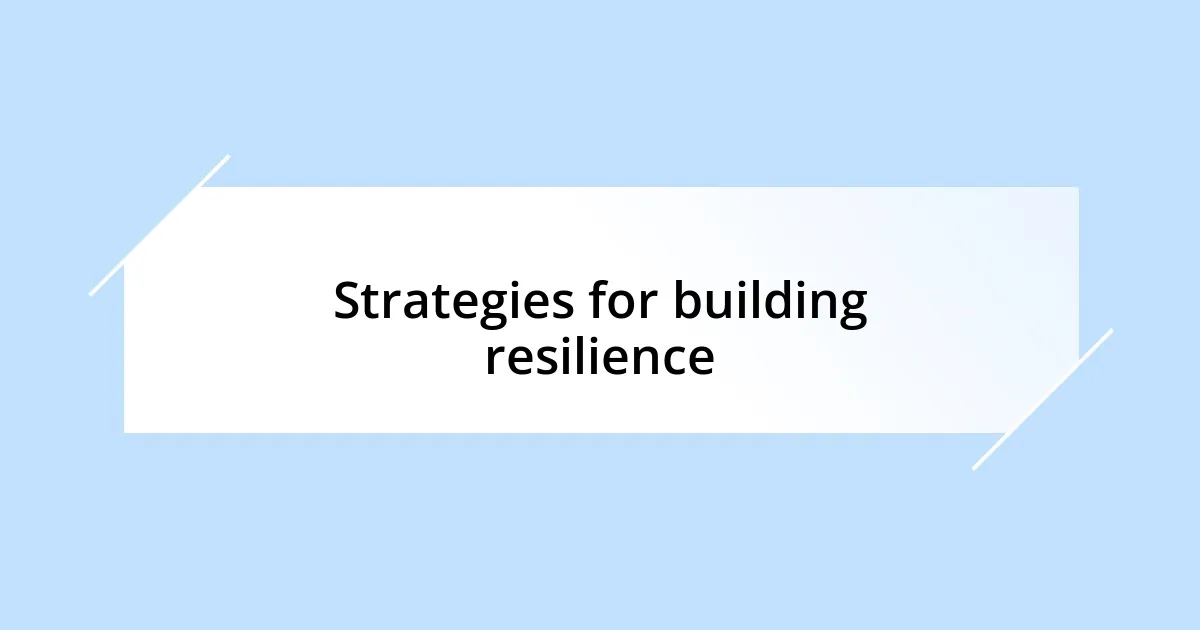
Strategies for building resilience
One powerful strategy for building resilience is developing a consistent self-care routine. I vividly remember when I started prioritizing my mental and physical health through regular exercise and healthy eating. Initially, it felt like just another task on my to-do list, but soon, I noticed how these small, positive changes helped me tackle stress with greater ease. How often do you take time for yourself in the busyness of everyday life?
Another effective approach is fostering a growth mindset, which involves viewing setbacks as learning opportunities. When I faced a significant setback in my writing career, I took a step back to analyze what went wrong. Instead of seeing it as a failure, I chose to see it as a chance to refine my skills. This shift in perspective not only propelled me forward but also strengthened my resilience. Have you ever reframed a challenging situation in your life to extract valuable lessons?
Lastly, surrounding yourself with positive influences can significantly enhance resilience. During a particularly challenging phase of my life, I took stock of my relationships and made an effort to engage more with those who uplifted and inspired me. It was remarkable how their encouragement and support made me feel more empowered to face my challenges. Who are the individuals in your life that inspire you to be your best self? Reflecting on these connections can unlock new strengths you didn’t realize you had.
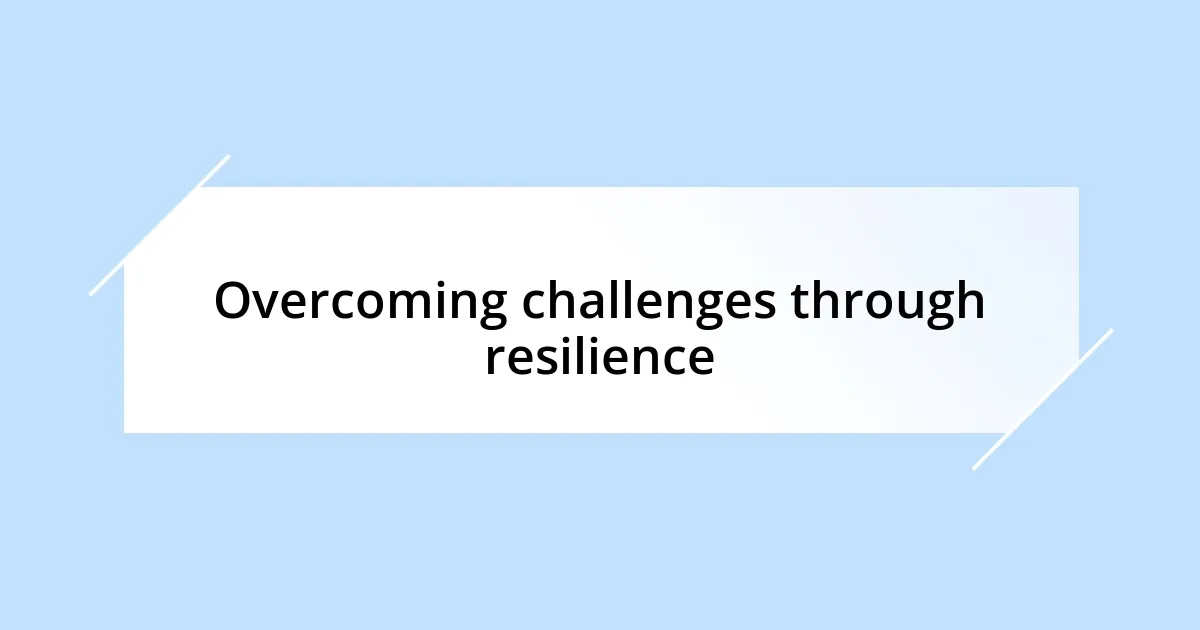
Overcoming challenges through resilience
Resilience often manifests in our response to challenges, shaping our ability to overcome them. I remember a time when I struggled with public speaking, a fear rooted deep within me. The first time I stood in front of an audience, my heart raced and my palms sweated. But rather than let that fear defeat me, I took it as an opportunity to confront my anxiety. Each time I stepped up, I felt a wave of unease, yet with every experience, I grew stronger. Have you ever faced a fear head-on and surprised yourself with the progress you made?
Another vivid memory comes from a time when I lost an important job opportunity. Initially, it felt like a dead end, but I realized it was my chance for reflection and growth. Instead of getting caught up in disappointment, I asked myself what I could learn from the experience. I started seeking feedback, refining my skills, and applying to new positions with renewed enthusiasm. This proactive approach not only helped me move forward but also reinforced my belief that challenges are often stepping stones towards something greater.
In facing life’s ups and downs, I’ve discovered that establishing a strong support system is crucial for resilience. When I went through a difficult breakup, reaching out to friends became my lifeline. They reminded me of my worth and provided encouragement during my toughest moments. Have you ever leaned on someone during a hard time and found it made all the difference? This reminder that we are not alone can be a powerful motivator to persevere through challenges. The bonds we nurture can truly fortify our resilience.
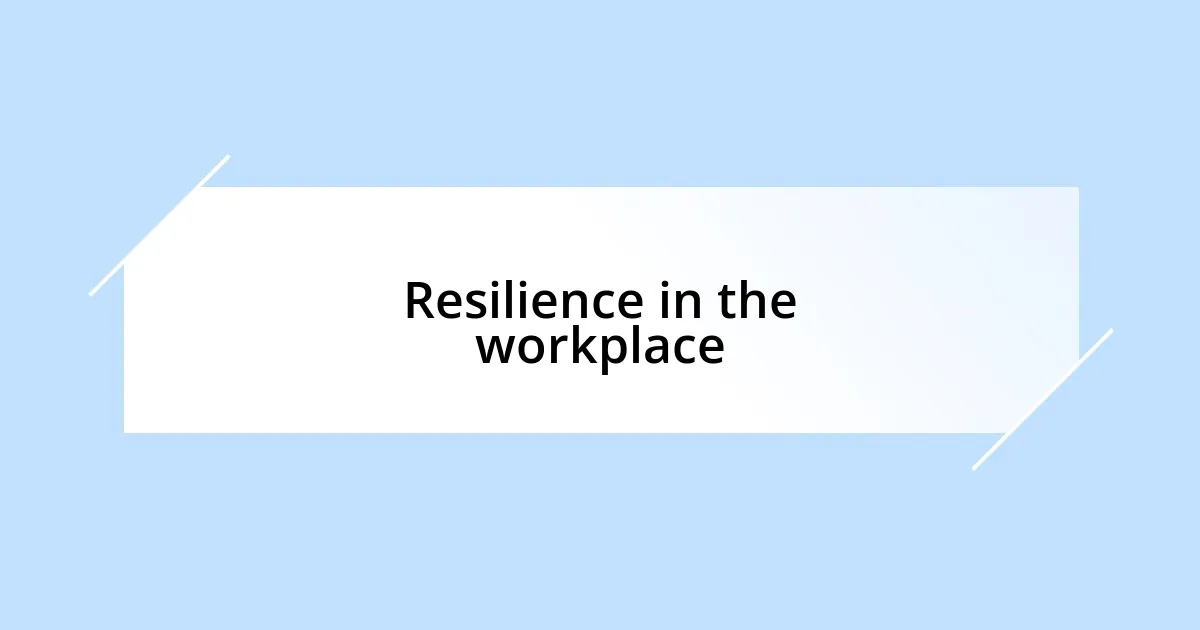
Resilience in the workplace
Resilience in the workplace often hinges on our ability to adapt and maintain productivity amidst challenges. I recall a particularly hectic quarter when deadlines loomed, and stress levels were high. Instead of succumbing to the pressure, I chose to focus on what I could control—my response. I made a conscious effort to break tasks into manageable chunks, which not only made the workload feel lighter but also empowered me to keep my head above water. How do you handle pressure when work gets overwhelming?
Another aspect I’ve found crucial is embracing collaboration. There was a time when my team faced unexpected setbacks on a project, and rather than retreating into silos, we came together for a brainstorming session. Sharing our thoughts and pooling our strengths not only helped us devise innovative solutions but also forged a deeper sense of camaraderie. Have you ever experienced the magic that teamwork can create during tough times? That shared energy can amplify resilience in ways we may not initially see.
I’ve also recognized the importance of setting realistic expectations for myself and my colleagues. Early in my career, I had this idea that working late and pushing through fatigue was the hallmark of dedication. But I learned the hard way that sacrificing well-being for productivity backfired. When I started advocating for balance and encouraging open conversations about workloads, I witnessed a rejuvenating shift in morale. How often do we overlook our limits in the pursuit of success? Striking that balance can foster a resilient workplace culture where everyone thrives.
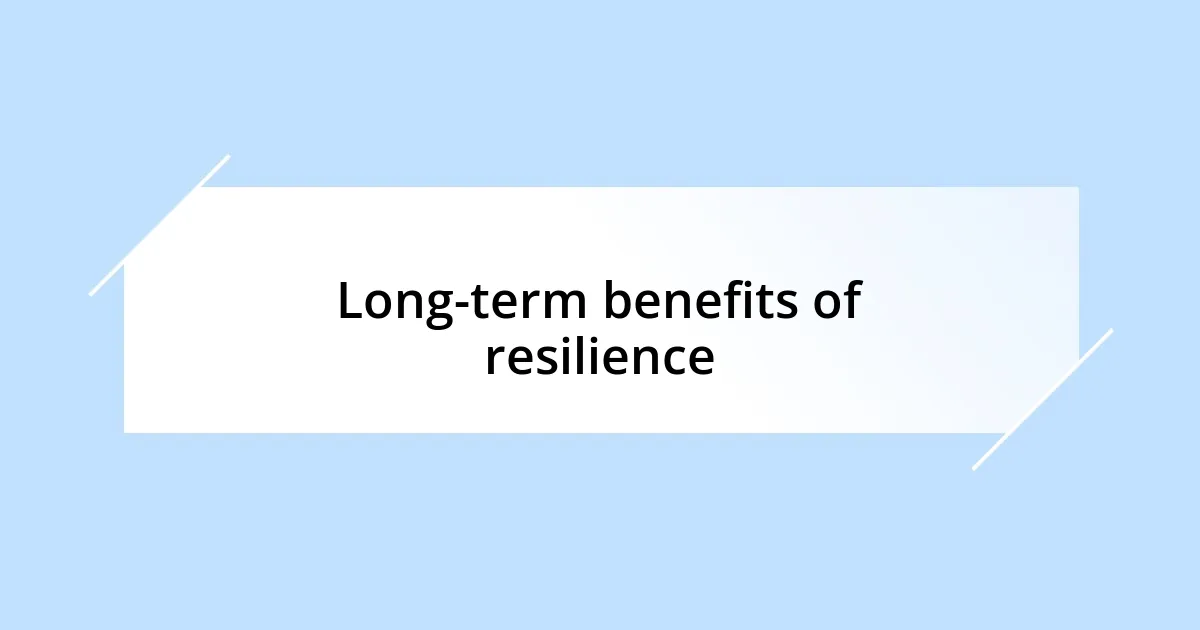
Long-term benefits of resilience
Resilience doesn’t just help in weathering storms; it also cultivates long-term personal growth. I remember when I faced a long-term health challenge that forced me to make significant lifestyle changes. It wasn’t just about managing the symptoms; it became a journey of self-discovery. I learned the importance of listening to my body and prioritizing my well-being, which has had lasting impacts on my overall quality of life. Have you ever faced a challenge that unexpectedly led you to develop healthy habits you might not have considered otherwise?
Another remarkable benefit is the enhanced ability to navigate future challenges. I can recall a time when a sudden shift in my career path left me feeling uncertain. Reflecting on previous hardships, I realized I had built a toolkit of coping strategies over the years. I was able to approach this new situation with a sense of confidence and adaptability. How empowering is it to draw on past experiences to guide you through present difficulties? This cycle of resilience reinforces our belief in our capabilities, further enriching our personal narratives.
Ultimately, resilience fosters deeper connections with others, which can serve as a safety net during tough times. After I supported a close friend through a significant life change, I felt our bond grow stronger. It highlighted how shared struggles can not only solidify relationships but also create a network of support that benefits everyone involved. Isn’t it fascinating how these connections can offer reassurance and encouragement, helping us all navigate life’s unpredictable turns? Building a resilient mindset doesn’t merely prepare us for challenges; it invites a community of shared experiences and understanding into our lives.











